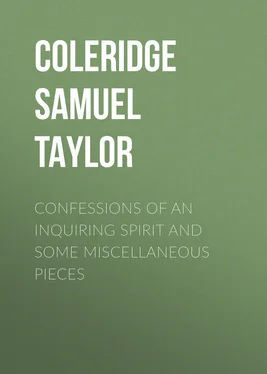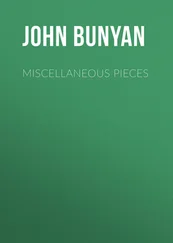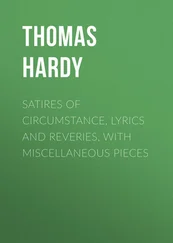Samuel Coleridge - Confessions of an Inquiring Spirit and Some Miscellaneous Pieces
Здесь есть возможность читать онлайн «Samuel Coleridge - Confessions of an Inquiring Spirit and Some Miscellaneous Pieces» — ознакомительный отрывок электронной книги совершенно бесплатно, а после прочтения отрывка купить полную версию. В некоторых случаях можно слушать аудио, скачать через торрент в формате fb2 и присутствует краткое содержание. Жанр: foreign_prose, foreign_religion, Философия, foreign_psychology, foreign_antique, на английском языке. Описание произведения, (предисловие) а так же отзывы посетителей доступны на портале библиотеки ЛибКат.
- Название:Confessions of an Inquiring Spirit and Some Miscellaneous Pieces
- Автор:
- Жанр:
- Год:неизвестен
- ISBN:нет данных
- Рейтинг книги:4 / 5. Голосов: 1
-
Избранное:Добавить в избранное
- Отзывы:
-
Ваша оценка:
- 80
- 1
- 2
- 3
- 4
- 5
Confessions of an Inquiring Spirit and Some Miscellaneous Pieces: краткое содержание, описание и аннотация
Предлагаем к чтению аннотацию, описание, краткое содержание или предисловие (зависит от того, что написал сам автор книги «Confessions of an Inquiring Spirit and Some Miscellaneous Pieces»). Если вы не нашли необходимую информацию о книге — напишите в комментариях, мы постараемся отыскать её.
Confessions of an Inquiring Spirit and Some Miscellaneous Pieces — читать онлайн ознакомительный отрывок
Ниже представлен текст книги, разбитый по страницам. Система сохранения места последней прочитанной страницы, позволяет с удобством читать онлайн бесплатно книгу «Confessions of an Inquiring Spirit and Some Miscellaneous Pieces», без необходимости каждый раз заново искать на чём Вы остановились. Поставьте закладку, и сможете в любой момент перейти на страницу, на которой закончили чтение.
Интервал:
Закладка:
And here again let me recur to the aid of analogy. Suppose a life of Sir Thomas More by his son-in-law, or a life of Lord Bacon by his chaplain; that a part of the records of the Court of Chancery belonging to these periods were lost; that in Roper’s or in Rawley’s biographical work there were preserved a series of dicta and judgments attributed to these illustrious Chancellors, many and important specimens of their table discourses, with large extracts from works written by them, and from some that are no longer extant. Let it be supposed, too, that there are no grounds, internal or external, to doubt either the moral, intellectual, or circumstantial competence of the biographers. Suppose, moreover, that wherever the opportunity existed of collating their documents and quotations with the records and works still preserved, the former were found substantially correct and faithful, the few differences in nowise altering or disturbing the spirit and purpose of the paragraphs in which they were found; and that of what was not collatable, and to which no test ab extra could be applied, the far larger part bore witness in itself of the same spirit and origin; and that not only by its characteristic features, but by its surpassing excellence, it rendered the chances of its having had any other author than the giant-mind, to whom the biographer ascribes it, small indeed! Now, from the nature and objects of my pursuits, I have, we will suppose, frequent occasion to refer to one or other of these works; for example, to Rawley’s Dicta et Facta Francisci de Verulam . At one time I might refer to the work in some such words as—“Remember what Francis of Verulam said or judged;” or, “If you believe not me, yet believe Lord Bacon.” At another time I might take the running title of the volume, and at another the name of the biographer;—“Turn to your Rawley! He will set you right;” or, “ There you will find a depth which no research will ever exhaust;” or whatever other strong expression my sense of Bacon’s greatness and of the intrinsic worth and the value of the proofs and specimens of that greatness, contained and preserved in that volume, would excite and justify. But let my expressions be as vivid and unqualified as the most sanguine temperament ever inspired, would any man of sense conclude from them that I meant—and meant to make others believe—that not only each and all of these anecdotes, adages, decisions, extracts, incidents, had been dictated, word by word, by Lord Bacon; and that all Rawley’s own observations and inferences, all the connectives and disjunctives, all the recollections of time, place, and circumstance, together with the order and succession of the narrative, were in like manner dictated and revised by the spirit of the deceased Chancellor? The answer will be—must be—No man in his senses! “No man in his senses—in this instance; but in that of the Bible it is quite otherwise; for (I take it as an admitted point that) it is quite otherwise!”
And here I renounce any advantage I might obtain for my argument by restricting the application of our Lord’s and the Apostle’s words to the Hebrew Canon. I admit the justice—I have long felt the full force—of the remark—“We have all that the occasion allowed.” And if the same awful authority does not apply so directly to the Evangelical and Apostolical writings as to the Hebrew Canon, yet the analogy of faith justifies the transfer. If the doctrine be less decisively Scriptural in its application to the New Testament or the Christian Canon, the temptation to doubt it is likewise less. So at least we are led to infer; since in point of fact it is the apparent or imagined contrast, the diversity of spirit which sundry individuals have believed themselves to find in the Old Testament and in the Gospel, that has given occasion to the doubt;—and, in the heart of thousands who yield a faith of acquiescence to the contrary, and find rest in their humility—supplies fuel to a fearful wish that it were permitted to make a distinction.
But, lastly, you object that—even granting that no coercive, positive reasons for the belief—no direct and not inferred assertions—of the plenary inspiration of the Old and New Testament, in the generally received import of the term, could be adduced, yet—in behalf of a doctrine so catholic, and during so long a succession of ages affirmed and acted on by Jew and Christian, Greek, Romish, and Protestant, you need no other answer than:—“Tell me, first, why it should not be received! Why should I not believe the Scriptures throughout dictated, in word and thought, by an infallible Intelligence?” I admit the fairness of the retort; and eagerly and earnestly do I answer: For every reason that makes me prize and revere these Scriptures;—prize them, love them, revere them, beyond all other books! Why should I not? Because the doctrine in question petrifies at once the whole body of Holy Writ with all its harmonies and symmetrical gradations—the flexile and the rigid—the supporting hard and the clothing soft—the blood which is the life —the intelligencing nerves, and the rudely woven, but soft and springy, cellular substance, in which all are imbedded and lightly bound together. This breathing organism, this glorious panharmonicon which I had seen stand on its feet as a man, and with a man’s voice given to it, the doctrine in question turns at once into a colossal Memnon’s head, a hollow passage for a voice, a voice that mocks the voices of many men, and speaks in their names, and yet is but one voice, and the same; and no man uttered it, and never in a human heart was it conceived. Why should I not?—Because the doctrine evacuates of all sense and efficacy the sure and constant tradition, that all the several books bound up together in our precious family Bible were composed in different and widely-distant ages, under the greatest diversity of circumstances, and degrees of light and information, and yet that the composers, whether as uttering or as recording what was uttered and what was done, were all actuated by a pure and holy Spirit, one and the same—(for is there any spirit pure and holy, and yet not proceeding from God—and yet not proceeding in and with the Holy Spirit?)—one Spirit, working diversely, now awakening strength, and now glorifying itself in weakness, now giving power and direction to knowledge, and now taking away the sting from error! Ere the summer and the months of ripening had arrived for the heart of the race; while the whole sap of the tree was crude, and each and every fruit lived in the harsh and bitter principle; even then this Spirit withdrew its chosen ministers from the false and guilt-making centre of Self. It converted the wrath into a form and an organ of love, and on the passing storm-cloud impressed the fair rainbow of promise to all generations. Put the lust of Self in the forked lightning, and would it not be a Spirit of Moloch? But God maketh the lightnings His ministers, fire and hail, vapours and stormy winds fulfilling His word.
Curse ye Meroz , said the angel of the Lord ; curse ye bitterly the inhabitants thereof —sang Deborah. Was it that she called to mind any personal wrongs—rapine or insult—that she or the house of Lapidoth had received from Jabin or Sisera? No; she had dwelt under her palm tree in the depth of the mountain. But she was a mother in Israel ; and with a mother’s heart, and with the vehemency of a mother’s and a patriot’s love, she had shot the light of love from her eyes, and poured the blessings of love from her lips, on the people that had jeoparded their lives unto the death against the oppressors; and the bitterness, awakened and borne aloft by the same love, she precipitated in curses on the selfish and coward recreants who came not to the help of the Lord , to the help of the Lord , against the mighty . As long as I have the image of Deborah before my eyes, and while I throw myself back into the age, country, circumstances, of this Hebrew Bonduca in the not yet tamed chaos of the spiritual creation;—as long as I contemplate the impassioned, high-souled, heroic woman in all the prominence and individuality of will and character,—I feel as if I were among the first ferments of the great affections—the proplastic waves of the microcosmic chaos, swelling up against—and yet towards—the outspread wings of the dove that lies brooding on the troubled waters. So long all is well,—all replete with instruction and example. In the fierce and inordinate I am made to know and be grateful for the clearer and purer radiance which shines on a Christian’s paths, neither blunted by the preparatory veil, nor crimsoned in its struggle through the all-enwrapping mist of the world’s ignorance: whilst in the self-oblivion of these heroes of the Old Testament, their elevation above all low and individual interests,—above all, in the entire and vehement devotion of their total being to the service of their divine Master, I find a lesson of humility, a ground of humiliation, and a shaming, yet rousing, example of faith and fealty. But let me once be persuaded that all these heart-awakening utterances of human hearts—of men of like faculties and passions with myself, mourning, rejoicing, suffering, triumphing—are but as a Divina Commedia of a superhuman—O bear with me, if I say—Ventriloquist;—that the royal harper, to whom I have so often submitted myself as a many-stringed instrument for his fire-tipt fingers to traverse, while every several nerve of emotion, passion, thought, that thrids the flesh-and-blood of our common humanity, responded to the touch,—that this sweet Psalmist of Israel was himself as mere an instrument as his harp, an automaton poet, mourner, and supplicant;—all is gone,—all sympathy, at least, and all example. I listen in awe and fear, but likewise in perplexity and confusion of spirit.
Читать дальшеИнтервал:
Закладка:
Похожие книги на «Confessions of an Inquiring Spirit and Some Miscellaneous Pieces»
Представляем Вашему вниманию похожие книги на «Confessions of an Inquiring Spirit and Some Miscellaneous Pieces» списком для выбора. Мы отобрали схожую по названию и смыслу литературу в надежде предоставить читателям больше вариантов отыскать новые, интересные, ещё непрочитанные произведения.
Обсуждение, отзывы о книге «Confessions of an Inquiring Spirit and Some Miscellaneous Pieces» и просто собственные мнения читателей. Оставьте ваши комментарии, напишите, что Вы думаете о произведении, его смысле или главных героях. Укажите что конкретно понравилось, а что нет, и почему Вы так считаете.












